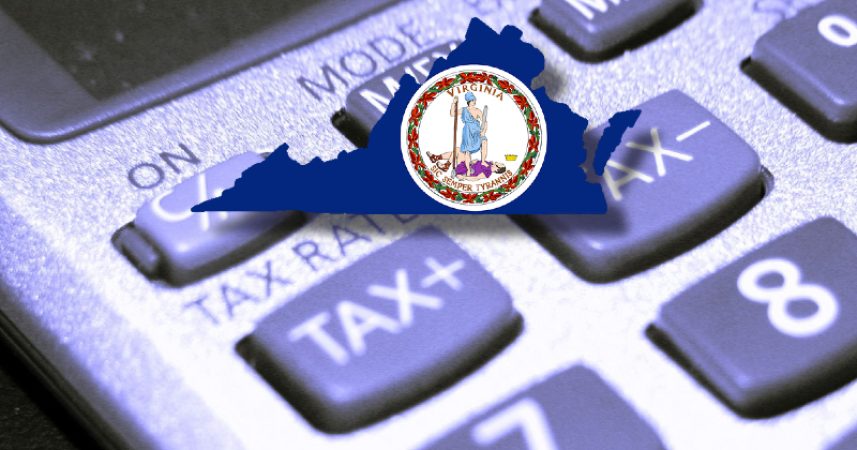Last week, the Republican majority in the Virginia House of Delegates passed a $1 billion package of tax cuts for individuals and businesses, the centerpiece of Governor Glenn Youngkin’s economic agenda. But Democrats, who have a two-seat majority in the state Senate, have a laundry list of policies and programs they would prefer to spend the surplus money on rather than return it to taxpayers.
Tax policy is a non-partisan issue that has real-world economic consequences, especially when it comes to taxes on business income. Here are five reasons why the state Senate should follow the House’s lead and pass the governor’s entire tax relief package, including reduction of the commonwealth’s corporate income tax rate:
- There’s a very large budget surplus
In fact, Virginia is sitting on a record budget surplus of $3.6 billion, which is revenue collected from businesses and individual taxpayers in excess of the needs and priorities state legislators have already identified and fully funded during the 2022-2024 biennial budget process. It’s disingenuous to suggest that Virginia “can’t afford” to return at least part of that surplus to taxpayers.
- Tax relief should be a priority
Senate Majority Leader Dick Saslaw, D-Fairfax, stated that “I don’t think cutting taxes … is the way to go because there’s a lot to be done.” But it was up to Saslaw and his colleagues in the General Assembly to make sure that any critical spending needs were included in the state budget. After all, setting spending priorities is a legislator’s most basic job, and taxpayers should not be penalized for their inaction.
Furthermore, a glance at the governor’s budget amendmentsshows that Youngkin is not proposing to spend the entire surplus (or even half of it) on tax relief. He’s asked for increased state spending in almost every department, including $500,000 to be used to lure the Washington Commanders to Virginia and $99 million for a one-time bonus for all state employees. If there’s enough surplus money for these and other nice-to-have wants, there’s enough for tax relief.
- Lower corporate income taxes spurs economic growth
The governor wants to reduce the corporate income tax rate for Virginia businesses from 6 percent to 5 percent, which Youngkin said was “the first step toward the ultimate goal of 4 percent at the end of our administration.” He also proposed a 10 percent Qualified Business Income Deduction for small businesses in the commonwealth, which aligns with a similar deduction in the federal tax code.
Virginia is one of 44 states that levy a corporate income tax, which ranges from 2.5 percent in neighboring North Carolina to 11.5 percent in New Jersey. Corporate income taxes are generally associated with lower economic performance because “they discourage the sort of activities which are most significant for growth, like investment in capital and productivity improvements,” according to the Tax Foundation. Such investments are key to creating jobs and making Virginia more competitive with its lower-tax neighbors.
Enhanced economic growth, in turn, increases future state revenue. So in a very real sense, corporate tax relief now will pay dividends for the state down the line.
- Corporations don’t pay taxes, people do
The late economist and Nobel laureate Milton Friedman soundly refuted claims that tax relief for corporations was just a government hand-out to the rich by pointing out that “the elementary fact is that ‘business’ does not and cannot pay taxes. Only people can pay taxes. Corporate officials may sign the check, but the money that they forward to Internal Revenue comes from the corporation’s employees, customers or stockholders.”
Reducing corporate income taxes ultimately benefits individuals because it lowers the cost of doing business, which is always passed on to customers via higher prices. Tax relief frees up money not only for capital investments and expansion, but also for employee salaries/benefits and stockholder dividends. Since the government cannot create new wealth, but can only redistribute it, a high tax burden makes Virginia less competitive when neighboring states like North Carolina and Kentucky are offering a much more business friendly environment.
- It’s the right thing to do
The sheer size of the budget surplus is clear evidence that the commonwealth has been overcharging taxpayers far beyond what was necessary to keep the state government functioning. Any corporation doing business in Virginia that overcharged its customers would soon be under investigation by the Attorney General’s Office and the State Corporation Commission, both of which required Dominion Energy to refund millions of dollars it had overcharged Virginians. It would be hypocritical for the state not to follow the same rules it imposes on everybody else.
For these reasons, tax relief has been a longstanding policy goal of the Thomas Jefferson Institute for Public Policy. Now that Virginia is finally in a fiscally sound position to ease the tax burden on businesses, the state Senate should not stand in the way.

Barbara Hollingsworth is Visiting Fellow with the Thomas Jefferson Institute for Public Policy. She may be reached at Barbholl3@gmail.com.






